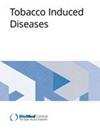美国老年人的地理位置、吸烟风险认知和当前吸烟情况。
IF 2.2
4区 医学
Q2 PUBLIC, ENVIRONMENTAL & OCCUPATIONAL HEALTH
引用次数: 0
摘要
简介在美国农村地区(相对于城市地区),吸烟和与吸烟相关的肺部疾病更为常见。本研究探讨了地理位置、卷烟风险认知与最易患吸烟相关肺病的老年人当前吸烟情况之间的关系。方法本研究对烟草与健康人口评估研究第 5 波中年龄≥40 岁的 12126 名受访者进行了二次数据分析。通过加权描述性统计和泊松回归,在三个独立模型中逐步评估了当前吸烟(与从不吸烟或曾经吸烟)与地理位置的关系,首先是未调整,然后是调整社会人口特征,最后是调整社会人口特征和卷烟风险认知(4 项量表)。敏感性分析检验了单个风险认知项目是否对地理位置与当前吸烟之间的关系有更大的影响。结果当前吸烟的农村居民(20.6%)比城市居民(17.6%)更常见。在逐步模型中,农村(与城市)居民与当前吸烟的风险比(RR)从1.17(95% CI:1.03-1.32)降至1.14(95% CI:1.01-1.29),再降至1.08(95% CI:0.96-1.21)。较低的卷烟风险认知混淆了农村与当前吸烟的关系,是吸烟的一个独立风险因素(调整RR,ARR=2.15;95% CI:1.94-2.18)。在敏感性分析中,认为香烟对健康非常有害或极其有害(vs 稍微有害、轻微有害或完全有害)以及同意(vs 不同意)二手烟会导致不吸烟者肺部疾病的观点会混淆农村居民与当前吸烟的关系,而认为吸烟会导致肺癌或吸烟者肺部疾病的观点则不会混淆农村居民与当前吸烟的关系。敏感性分析的结果突出了旨在促进人们更准确地认识吸烟对健康的有害影响的宣传活动的潜在目标。本文章由计算机程序翻译,如有差异,请以英文原文为准。
Geographical location, cigarette risk perceptions, and current smoking among older US adults.
INTRODUCTION
Cigarette smoking and smoking-related lung disease are more common in rural (vs urban) areas of the United States (US). This study examined relationships between geographical location, cigarette risk perceptions, and current smoking among older adults who are at greatest risk of developing smoking-related lung disease.
METHODS
The study was a secondary data analysis of 12126 respondents aged ≥40 years from Wave 5 of the Population Assessment of Tobacco and Health Study. Weighted descriptive statistics and Poisson regressions assessed current smoking (vs never or former) as a function of geographical location in a stepwise fashion, first unadjusted, then adjusting for sociodemographic characteristics, and finally for both sociodemographic characteristics and cigarette risk perceptions (4-item scale), in three separate models. Sensitivity analyses examined whether individual risk perceptions items had a greater impact on the association between geographical location and current smoking.
RESULTS
Current smoking was more common among rural (20.6%) than urban (17.6%) residents. The risk ratio (RR) for rural (vs urban) residence on current smoking decreased from 1.17 (95% CI: 1.03-1.32) to 1.14 (95% CI: 1.01-1.29) to 1.08 (95% CI: 0.96-1.21) across the stepwise models. Lower cigarette risk perceptions confounded the rural-current smoking association and was an independent risk factor for smoking (adjusted RR, ARR=2.15; 95% CI: 1.94-2.18). In sensitivity analyses, believing that cigarettes are very or extremely (vs somewhat, slightly, or not at all) harmful to health and agreeing (vs not agreeing) that secondhand smoke causes lung disease in people who do not smoke, confounded the rural-current smoking association whereas beliefs about smoking causing lung cancer or lung disease in people who smoke did not.
CONCLUSIONS
Lower cigarette risk perceptions among rural residents confounded the positive association between rural residence and current smoking. Results from sensitivity analyses highlight potential targets for communication campaigns aimed at promoting more accurate perceptions of the harmful health consequences of cigarette smoking.
求助全文
通过发布文献求助,成功后即可免费获取论文全文。
去求助
来源期刊

Tobacco Induced Diseases
SUBSTANCE ABUSE-PUBLIC, ENVIRONMENTAL & OCCUPATIONAL HEALTH
CiteScore
5.30
自引率
5.40%
发文量
95
审稿时长
12 weeks
期刊介绍:
Tobacco Induced Diseases encompasses all aspects of research related to the prevention and control of tobacco use at a global level. Preventing diseases attributable to tobacco is only one aspect of the journal, whose overall scope is to provide a forum for the publication of research articles that can contribute to reducing the burden of tobacco induced diseases globally. To address this epidemic we believe that there must be an avenue for the publication of research/policy activities on tobacco control initiatives that may be very important at a regional and national level. This approach provides a very important "hands on" service to the tobacco control community at a global scale - as common problems have common solutions. Hence, we see ourselves as "connectors" within this global community.
The journal hence encourages the submission of articles from all medical, biological and psychosocial disciplines, ranging from medical and dental clinicians, through health professionals to basic biomedical and clinical scientists.
 求助内容:
求助内容: 应助结果提醒方式:
应助结果提醒方式:


